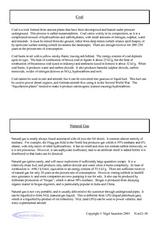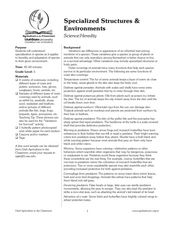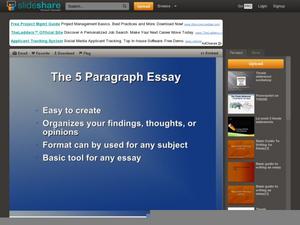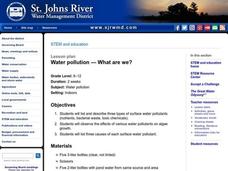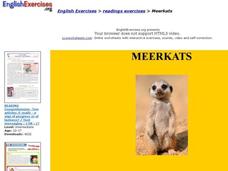American Museum of Natural History
What's This? Staying Safe
Amaze the class with the creative adaptations species employ to trick predators. An online interactive lesson introduces learners to six different species with unique adaptations. Each species highlights a different adaptation and its...
Curated OER
Fuels - The Good, the Bad, and the Ugly
Science pupils choose from twelve questions about five different types of fuel: hydrogen, ethanol, crude oil, natural gas, and coal. They construct a table to compare them and then determine which is the best fuel. Your physical science...
Biology Junction
Viruses, Viroids, and Prions
Are viruses living or non-living? According to the presentation, they are both and neither. Clearly, this requires clarification and an in-depth look at viruses, viroids, and prions. Young scientists learn about the history, structure,...
American Museum of Natural History
What's This? Colorful Creatures
An online resource shows learners some species that are very good at using their camouflage as well as other ways species use their coloring for survival. Interactive and digital, the lesson is perfect as a remote learning resource.
Curated OER
Protect Yourself
Students read about the marketing of permethrin-treated clothing to help prevent insect borne illnesses. They design a poster to create awareness of an insect, animal or plant species which is harmful to humans.
Curated OER
Ecosystems
Students study ecosystems and the biodiversity within. In this ecosystems lesson students complete a lab activity and assess the biodiversity in their own community.
Curated OER
Specialized Structures and Environment
Fifth graders read about how different animals protect themselves, and how characteristics give animals an advantage in their environment. Students then discuss a variety of "outer" wear for humans, and what they might choose to wear in...
Curated OER
Prairie Predator and Prey
Fifth graders brainstorm a list of animals that live on the prairie, and classify them as predators and prey. They conduct interviews where they ask the animals what they need to look out for to sustain life on the prairie.
Curated OER
Food Safety-Consumers Need the Facts
Students begin by completing a survey asking them to rank their concerns about commercially prepared foods. They develop a definition of relative risk, and complete the "Pro or Con" worksheet. Students work in groups to make a study of...
Curated OER
Air, Air Everywhere! Lesson 2: Acid Rain
Middle school environmentalists record the pH of four different liquids, including two aerosol cleaning products. They liken the products to acid rain and speculate in writing which might affect the human respiratory system. Although...
Curated OER
The 5 Paragraph Essay
The value in this PowerPoint about the five-paragraph expository essay comes from the clear explanations and specific examples provided to illustrate each aspect; however, a complete, model essay is not included. Beware the typos!
Curated OER
Panning for Gold and Magnetite
Students pan for minerals in a stream and discover why magnets attract magenitite but not nonmagnetic grains. They participate in the actual panning process and bag samples to be examined in class. Students recognize minerals by color...
Curated OER
What Are We?
Students list and describe three types of surface water pollutants. They observe the effects of various water pollutants on algae growth. Three causes of each surface water pollutant is listed.
Curated OER
What Happens When Invasive Species Are Introduced
Helping students understand the dangers of nonnative species is an important part of ecology and environmental science lessons.
Curated OER
An Antidote to Plagiarism
Young scholars discover how to write a research paper without directly copying written material. They read a passage, then record on the board any words that are new for them. They define these words, then organize their facts to create...
Curated OER
Ask Rustle the Leaf About...Acid Rain
In this acid rain worksheet, students read about acid rain from a leaf's perspective. They fill in the blanks with 9 terms to complete a paragraph about acid rain. They also are given 8 clues to complete a crossword puzzle. Their is a...
Curated OER
Not So Neutral Views
Students explore ways to use indicators to distinguish between acids and bases. They conduct an experiment to model and discuss the harmful effect of acid rain in our living and non-living environment.
Curated OER
Chemistry Crossword
In this chemical reactions activity, students complete a crossword puzzle by figuring out the vocabulary words associated with 34 clues.
Curated OER
Biology: living Things and their Environment
Students recognize that organisms depend on other organisms. For this organism lesson, students understand symbiotic relationships and competition. Students explain food chains and food webs. Students understand that change is always...
Curated OER
MeerKats - Reading Exercises
In this meerkats reading comprehension online worksheet, students read a story about meerkats. They insert the proper words into the selection using words from the bank at the bottom of the page.
Curated OER
Models as Tools for Ecosystem Management
Fifth graders explore the concept of environmental management. In this ecosystem lesson, 5th graders discover how models help scientists learn more about managing ecosystems. Students create their own model, make observations and...
Curated OER
Atoms and Molecules
You can use hands on and kinesthetic activities to teach abstract concepts, such as atom and molecule lessons.
Curated OER
Little Me in a Big World: Ants
Pupils use the life cycle of an ant to learn about their own self-esteem. In this self-esteem lesson plan, students read books about ants and discuss obstacles from the stories as well as the ant behavior.
Curated OER
Taxonomy Project
Students act as a taxonomist and, given a certain situation, classify existing organisms.



